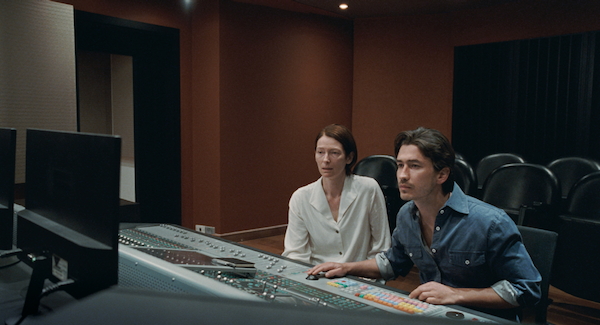Movie review by Greg Carlson
In one of the best scenes of the year, Tilda Swinton’s Jessica Holland sits with audio engineer Hernan Bedoya (Juan Pablo Urrego) behind a massive mixing console in a recording studio in Colombia, working to recreate a mysterious sound that she has been hearing intermittently. Drawing initially from a collection of stock effects, Jessica and Hernan take their time as they methodically narrow down the possibilities, closing in on the particular qualities of the bang that has intruded in Jessica’s life. Shaping and bending the wave with his digital tools until Jessica is satisfied, Hernan is as unhurried as anyone in the cinema of Apichatpong Weerasethakul, a modern master of the slow and contemplative style of storytelling some would call transcendental.
This exchange in “Memoria” illustrates the filmmaker’s playful sense of humor regarding the artistic enterprise, a kind of winking, behind-the-curtain glimpse at the sausage-grinding process of making sure all the post-production details are just right. The sound Hernan ultimately conjures, for all intents and purposes, is indistinguishable from the one that has been following Jessica around, disrupting her sleep and messing with her head. But reading “Memoria” as metanarrative unlocks only one layer of joy – Weerasethakul treats Jessica’s quest with complete respect. The source of the sound is eventually revealed. And with that revelation, the filmmaker just GOES FOR IT.
Both Weerasethakul’s full-length collaboration with Tilda Swinton and the “Memoria” project have been a long time coming. Swinton was to have appeared in “Cemetery of Splendour” (she also contributed to the first English-language book on the filmmaker, published in 2009). Weerasethakul spent time in Colombia in 2017 to develop what would become his first feature shot outside Thailand. The global constitution of “Memoria” may also represent a bid for greater creative freedom; Weerasethakul has for years been frustrated by the censorship imposed in his home country.
“Memoria” entices with its aural preoccupations, but the film is rich with many other ideas and explorations. Admirers of Weerasethakul’s filmography, which includes the brilliant 2010 Palme d’Or winner “Uncle Boonmee Who Can Recall His Past Lives,” can bask in the sublimity of Jessica’s episodic encounters. The best of these may be the shift from the urban Bogota to the rural Amazon jungle: Jessica leaves the city only to meet another Hernan Bedoya (Elkin Diaz) whose total recall and superpowered sleeping abilities are as remarkable as his surprise connection to Jessica. Is this second Hernan, rhyming like David Lynch’s “two Chalfonts” or Fred Madison/Pete Dayton, a coincidence, a doppelganger, a mirror?
The film’s official website is as delightfully enigmatic as the experience of watching “Memoria.” It contains a section called “Bang Stories,” a quartet of firsthand accounts of alarming sounds ranging from the comic to the unnerving to the traumatizing. Superfans will also discover the opportunity to purchase a hardcover, companion art book containing “photographs, a personal diary and sketchbook, research notes, treatment excerpts, and email correspondence.” Scouring the website for clues and insights also turns up this absolute catnip: Weerasethakul writes, “I imagine a scenario in which Jessica Holland, a comatose character from Jacques Tourneur’s ‘I Walked with a Zombie,’ wakes up. She finds herself in Bogota, being drawn by a dream or a trauma that she doesn’t remember.” Count me in.
